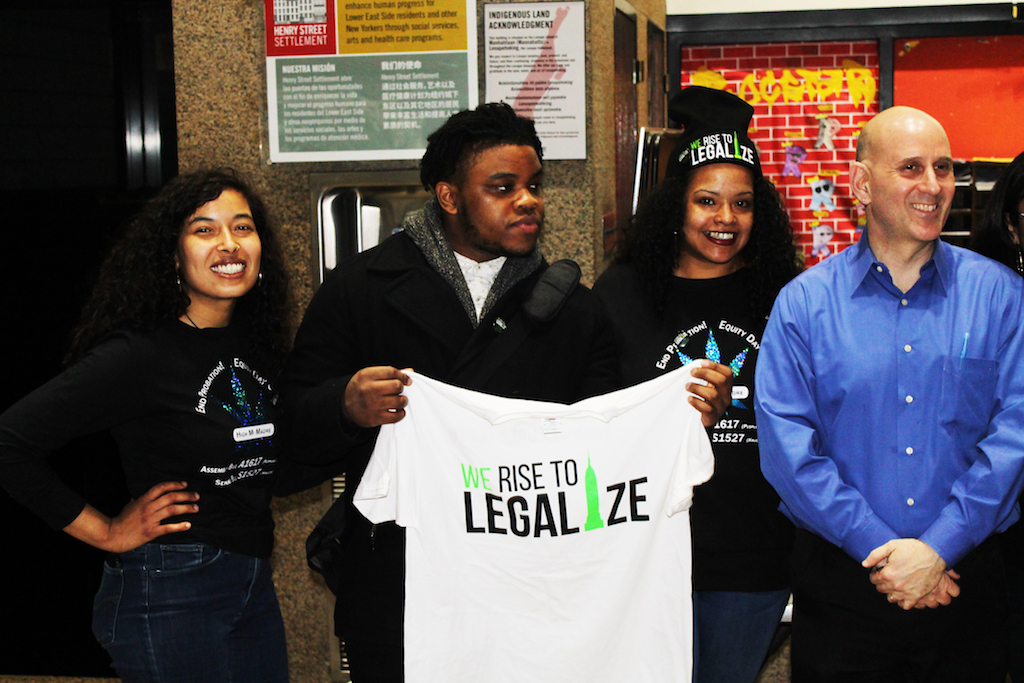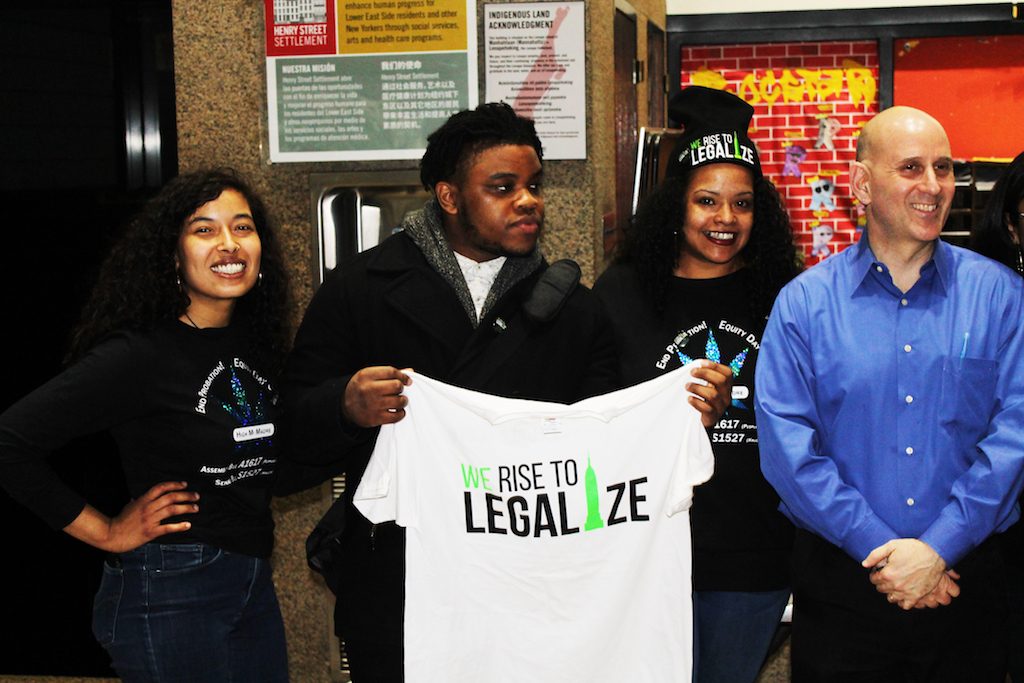
BY LINCOLN ANDERSON | Recreational pot could become legal in New York State in as soon as one month from now, on April 1. That’s no April Fools’ joke — it’s a real possibility.
In January, Governor Andrew Cuomo announced in his State of the State speech that legalizing adult-use marijuana was one of his priorities. He also slipped his own pot-legalization bill into the state budget — meaning it could become law on April 1, when the budget is scheduled to be approved.
Against that rapidly approaching backdrop, Assemblymember Harvey Epstein led a forum on pot legalization on Sun., March 3, at the Boys and Girls Republic, on E. Sixth St., between Avenue D and the F.D.R. Drive.
Among the top issues voiced was the idea of “Day One equity” — namely, ensuring that local black and Latino entrepreneurs don’t lose out to national corporations when licenses for pot dispensaries are given out. Also, there are actually two bills — one by the Assembly and state Senate, in addition to the one by Cuomo — and the consensus among those at the forum was that Cuomo’s is too restrictive, so must be blocked.
About 75 people turned out for the event. In addition to Epstein, Congressmember Carolyn Maloney and Manhattan Borough President Gale Brewer also spoke, as well as Kassandra Frederique, New York State director of the Drug Policy Alliance.
Epstein is a co-sponsor of the Assembly’s Marijuana Regulation and Taxation Act a.k.a. MRTA (pronounced “Marta”). Cuomo’s bill, on the other hand, is known as the Cannabis Regulation and Taxation Act, or CRTA (“Carta).
In his opening remarks, Epstein stressed of legalization, “We have to see how it affects our community — especially low-income people of color.” The process of legalizing weed, so far, he said, has been “mostly geared toward private-equity firms and rich white guys.”
In short, the assemblymember said of the challenge: “If we legalize it, how do we fight the corporate takeover of legalization? How do we fight the barriers [to local people getting involved]?”
What is needed, he said, is a range of initiatives, “from seed to sale,” including commercial training and affordable rent, among other things.
If steps aren’t taken, hedge-fund types will swoop in, he warned, saying, “We’re going to see this industry come to be dominated by white men — and, as a white guy, that’s the last thing I want to see happen.”
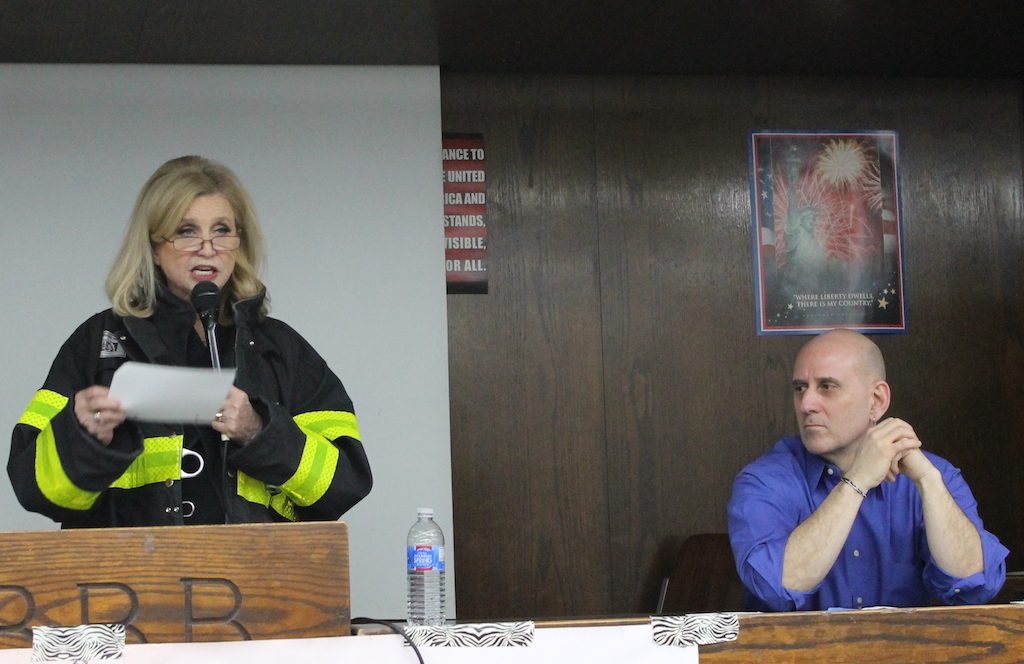
In her comments, Maloney said, “I strongly believe that it’s time to legalize marijuana for recreational use in the United States. … It is also absurd that the [Drug Enforcement Administration] still lists marijuana as a Schedule 1 drug along with heroin,” she added.
Maloney noted she is part of the Cannabis Caucus in D.C. and is working on a federal legalization bill. Sounding a refrain oft voiced during the event, Maloney said pot revenue should be invested in communities “that were harmed,” referring to excessive arrests of blacks and Latinos by police for low-level pot offenses.
Going into that subject in depth, Frederique of the Drug Policy Alliance recapped the history of pot enforcement in New York since 1971, when, as she put it, “Richard Nixon declared the War on Drugs.”
“New York State was the first to do mandatory penalties for low-level possession,” she noted.
Outcry from parents — specifically, white parents — led to criminal penalties for low-level pot possession being dropped in 1977, she said. Possession of a small amount of pot was typically just a $100 ticket back then.
However, under Mayor Rudy Giuliani in the 1990s, pot arrests spiked massively and stayed high until only recently, she explained. Previously, police could only make an arrest if the pot was in plain view or burning. But, by using a new technique — stop-and-frisk — police could pull pot out of a person’s pocket, then arrest him for it.
“It was intentional, it was strategic,” she said.
As recently as 2011, there were around 50,300 pot arrests in the city, Frederique noted, adding that would nearly fill all the seats in Yankee Stadium.
“Eighty-five percent of those arrests were black and Latinx,” she said, using the gender-neutral term for Latino.
In 2016, there were fewer pot arrests in the city, though still quite a lot — around 22,000 — “the capacity of Barclays [Center],” she noted.
Basically, Frederique, and others, argued that because cannabis convictions have been so unfairly skewed against blacks and Hispanics, “[pot] decriminalization has to be as comprehensive as the damage that was done.”
Currently, pot convictions can also impact parents in child-welfare cases, cause evictions and put immigrants at risk, she noted.
Medical marijuana was approved in New York under Cuomo in 2014, but was “super-restrictive,” Frederique noted.
“The goal was to prevent diversion,” she explained. “Cuomo did not want it diverted to ‘unruly characters.’ If you are melanated in this room, you know what that means.”
Ultimately, she said, pot must be fully decriminalized or “they will continue to criminalize black and brown bodies — and then we are all complicit in the deaths that will happen.”
In that vein, she recalled the case of Ramarley Graham, who was fatally shot by police in 2012 in his Bronx home after having been observed allegedly making a low-level drug sale outside.
Giving some insight into the legislative process, Frederique noted that “controversial bills” are often stuck in the state budget “because it gives them cover.” (Like the pot-legalization bill, the congestion-pricing bill is also packed into the state budget.) If the pot bill is pulled out of the state budget, then it still could be passed before the end of the legislative session in June. The activist was skeptical, though, if the pot bill gets bumped into the next legislative session, which starts in January 2020, that it would pass then.
“If the people are shaky now,” she said, “it’s an election year [next year], they’re not going to pass it next year.”
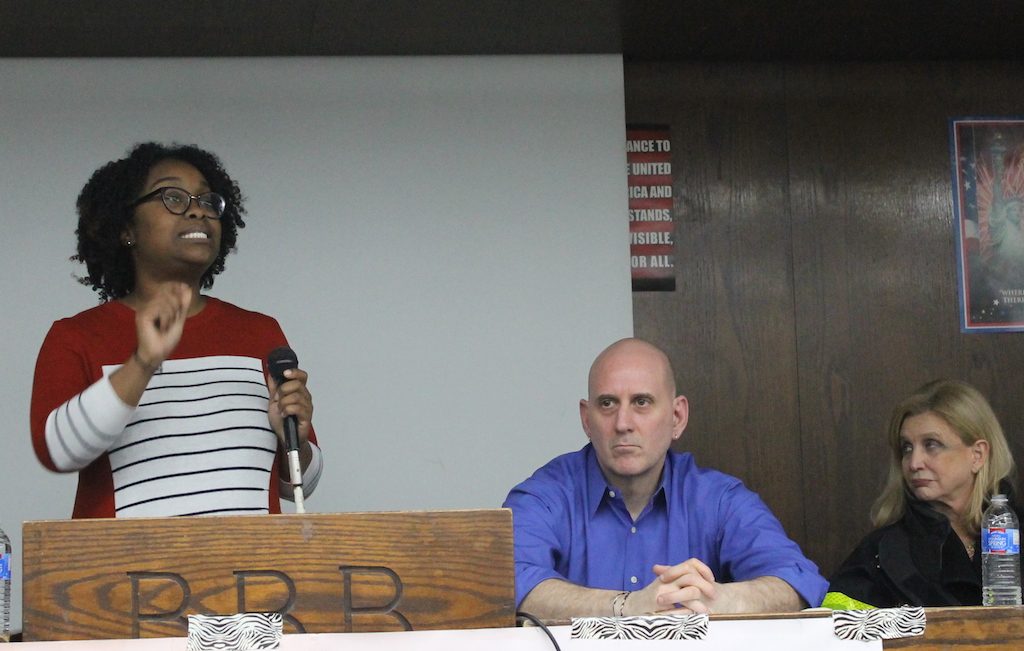
Epstein said he actually hopes legalization is not passed with the current budget “because then we can have a conversation” about problematic aspects of the bill.
“If it doesn’t get passed in the budget, then we want to pass it by June,” he said.
Borough President Brewer said she is “nervous” about big money horning in on the legal pot trade.
“The Harlem community board had a meeting on starting up pot businesses, and all these national corporations showed up,” she said. “They asked them to leave. I’m nervous about that… . It has to be done correctly.”
Brewer added there are also still more than a few questions, such as on enforcement against driving stoned.
“Breathalyzer — how would that be done?” she asked.
Although the Assembly and state Senate bills call for sealing records on some pot arrests, “there is no expungement in New York,” Frederique noted. Plus, companies may have obtained pot-arrest records prior to their being sealed, she added.
Next, the forum broke down into two groups, one focusing on decriminalization, the other focusing on starting up pot businesses.
In the latter session, there was discussion of MRTA, the Legislature’s bill, versus CRTA, the governor’s bill.
Epstein stated, “The focus is to get the governor’s proposal off the table.”
“There’s no home-grown in CRTA,” objected Paul Gilman, a Yippie and Green Party member.
“You have community grow rooms!” a woman chimed in with an enthusiastic grin. “You have community gardens! This is what it’s about now, it’s not about judges and lawyers anymore.”
Dan Hogle, of the group We Rise To Legalize, added that, under CRTA, there would be an executive director of cannabis management appointed by the governor — meaning the governor would wield the control. Under MRTA, the state Senate would have a confirmation hearing on the cannabis czar.
Both bills have an option for municipalities of more than 100,000 people to opt out, he added.
“If Suffolk County says it doesn’t want to issue [pot dispensary] licenses, people will drive to Nassau and Nassau County will get revenue to rebuild its roads,” he said.
Hogle later added that MRTA would allow up to six pot plants to be grown in a private residence at any given time. But there could be some unforeseen consequences to this, he noted. For example, if everyone in a 200-unit apartment building was growing pot plants, it could cause a spike in electrical use.
“To grow marijuana, the first six weeks, you need grow lights 24/7,” he explained.
As for why the plants can’t just be put on the windowsill for natural light, he said the bill states they can’t be visible from the street.
CRTA would allow 10 companies to run the state’s recreational pot business.
Ostap Vidov, from Westchester, who has a company called Green Nectar, said he wants a dispensary license. He figured it would take $750,000 to $1 million to get a dispensary up and running.
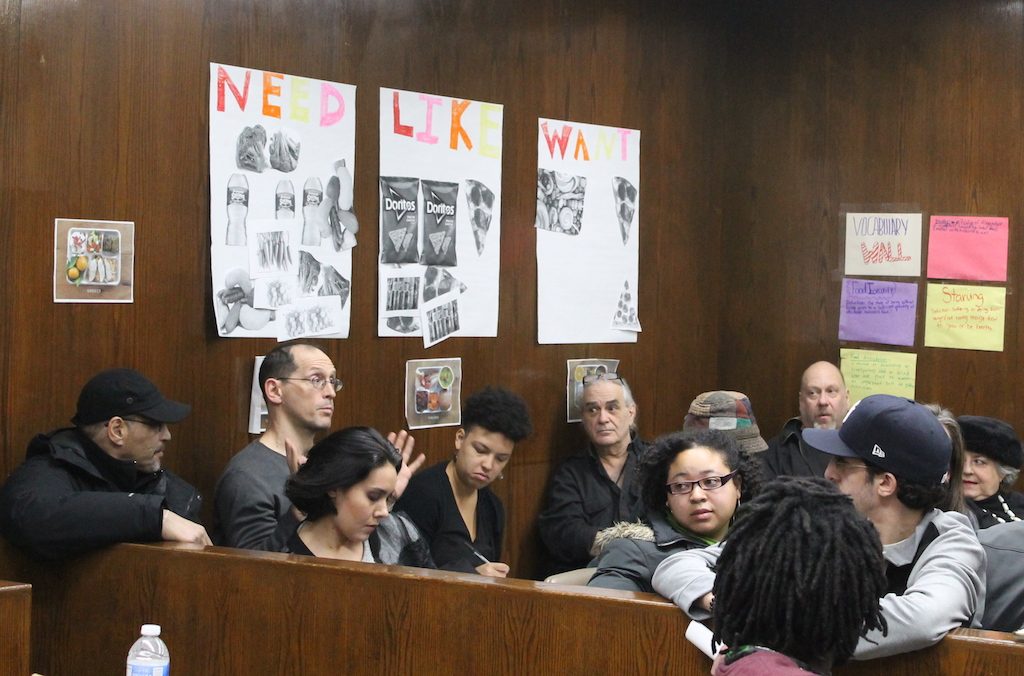
Emily Ramos, from the Lower East Side, and Pilar DeJesus are partners in a new venture, High Mi Madre. They currently have a local co-op selling cannabidiol, or CBD. Derived from the pot plant’s flowers, CBD is said to be relaxing but lacks the active ingredient, THC, that gives a high.
“We want to get into adult recreational [pot],” Ramos said.
Pot criminalization had a devastating impact on her own family, she said.
“My dad was actually arrested in 1993 in the Baruch Houses for selling pot,” she said, referring to the nearby Lower East Side public-housing complex. “He went to jail for five years.”
Her business partner DeJesus added they firmly want, “Equity on Day One” of legalization.
While most at the event were pro-pot legalization, one Stuyvesant Town resident came because she thinks weed stinks — literally. She buttonholed Epstein afterward to complain about all the pot smoking in Stuy Town.
“I don’t see my issues getting addressed,” she told this paper.
A woman on the first floor is filling the lobby with her smoke, said the resident, a retiree who requested anonymity.
“Oh, it’s horrible sometimes,” she said. “And she’s masking it with perfume and incense. I know that New York State is going to make a ton of money off of this, but what about those of us who don’t want to smell this stuff?
“It stinks!” she blurted out, in frustration.
Asked if Stuy Town has a lot of university students who might be getting high, she said, “We’re flooded with students. I don’t think it’s us older people who are smoking.
“I get all the disenfranchisement. I get all the unfairness,” she said of issues raised at the forum. “But there are consequences to the rest of us. I’m assaulted with pot smell — and now I’m going to be even more.”
She said she feared, with legalization, she would be smelling it more now on the street and on the Stuy Town grounds, and would not be able to open her windows anymore due to all the toking.
But, listening in, Michael Schweinsberg, of the 504 Democrats, a political club whose members have disabilities, and who is familiar with the bills’ language, corrected her. He said it would still be illegal to smoke a joint on the street or in a park — just like the rules against public drinking. Similarly, it would be illegal for people under age 21 to use pot, he added. Of course, it would be a question of enforcement.
“I don’t care that it’s a gateway drug,” the woman groused. “If they want to kill themselves, that’s fine. I care that it stinks.”
She said she was also worried about stoned drivers and cyclists.
Assemblymember Richard Gottfried, chairperson of the Assembly’s Health Committee, previously told this paper that vaping could be an answer to reducing the smell of pot in apartment buildings. Asked about that, Epstein agreed it probably would help somewhat.



